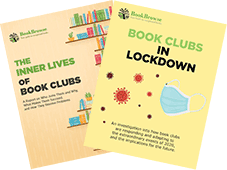 I used to think that participation in public library book groups would be somewhat transient--people would drop in for a few months while they decided if they liked the concept, at which point they'd go off and join a private group, or start their own.
I used to think that participation in public library book groups would be somewhat transient--people would drop in for a few months while they decided if they liked the concept, at which point they'd go off and join a private group, or start their own.
How wrong I was!
One of the core findings of our recently released report on the dynamics of book groups: The Inner Lives of Book Clubs, is how much people love their library book groups and how loyal they are to them.
The research also shows that public library book clubs are a great fit for many who are looking to join a book group. For example:
When we ask people interested in joining a book club to describe their ideal group, some say they would like an all-women group ("mansplaining" came up more than once), but most women and almost all men would prefer a diverse group with people of different ages and genders, and from a variety of backgrounds.
When we look at the profile of public book clubs compared to private groups, we see that the latter tend to be more homogeneous. For example, when asked to approximate the age range in their book club, 39% of those in public groups estimated a spread of at least 20 years, compared to 17% in private groups. And 88% of private book clubs are all women (some by choice, others because they haven't been able to recruit any men), whereas about half of public groups have at least one man in their group, and almost all are open to men.
When we ask people interested in joining a book club what their ideal group size would be, the majority say between 8-12 members. Most public library meeting rooms can easily accommodate this number, but many homes cannot; and, of course, not everyone enjoys hosting (in fact, almost 30% of private book clubs generally meet somewhere other than a private home.)
Additionally, among those interested in joining a book club who expressed a preference, half would prefer a public location, the most popular choices being a coffee bar or library (of the remainder, 30% preferred a private home, 20% online).
Many people who don't have book club experience have the common misconception that book clubs are just an excuse for a night of gossip and a glass or two of wine; but, in fact, 84% of those we surveyed are in groups that spend at least 40 minutes of each meeting on book discussion.
Additionally, statistically speaking, the longer the discussion, the happier the membership: 55% of respondents in groups that generally discuss the book for 20 minutes or less say they are "very happy" in their group, compared to 73% in groups that discuss for 50-60 minutes, and 81% in groups that discuss for 75 minutes or more.
Socializing is important to many--43% of those in public book clubs and 71% of those in private groups say that socializing before or after the discussion is very important to them; and most who wish to join a book group would like there to be a social element. But the great majority are clear that their primary interest is the book discussion itself. A core reason for this, as many observe, is that it is through the deep discussion of a book that one can get to know people in ways that are not always possible in a purely social setting. So, the public book group format--generally meeting for 60 to 90 minutes and spending most of that time on discussion--is an attractive proposition for many. And of course, people are free to socialize before and after the meeting if they wish.
When we ask people interested in being in a book club their views on food, almost everyone would like it to be kept to a minimum. So, the fact that public library book clubs generally do so is a positive for prospective participants. According to our research, 38% of public library book clubs have no food at all, 31% have a snack provided by the library, and 27% say that "sometimes someone will bring something, sometimes not." Just 4% say "most/all of us bring something to share."
As for that ubiquitous glass of wine that we see in media portrayals of book clubs, only half of private book groups even have alcohol at their meetings on a regular basis; so, its absence at most public library book groups is unlikely to put off most prospective participants.
According to our 2015 survey, 61% of women in book clubs get reading recommendations from a librarian at least occasionally. So, what could be better than being part of a group led by a librarian who can not only advise on good book choices but is also probably responsible for much of the administration, and might even be able to source books for the group?
Half of those in public library book groups usually pick titles that their library has available as book club kits (for those who are unfamiliar with the concept, these are bags that can be checked out to one book group member containing multiple copies of a title, plus, often, other information such as a discussion guide). And, in groups where the members are free to pick any title, some librarians will help source copies for those who wish to borrow from the library.
On a side note, just because it's a library book club doesn't mean everything needs to be on the librarian's shoulders. We heard from a number of book club leaders who felt burdened; and, equally, we heard from group members who wished they could be more involved. So, if you are a book club leader currently doing most things yourself, you might want to see if others in the group would like to step up. For example, in about half of public book groups, the facilitator is responsible for preparing discussion questions and researching background information--tasks that could be shared with others in the group; and the role of facilitator itself is rotated in 30% of public book clubs.
As we have seen, the research shows that not only do existing members love their library book groups, the typical format of a library group is a great fit for many interested in joining a book club.
So, what is stopping people from joining?
For 39%, it's simply a matter of time--they hope to join a book group sometime in the future when, for example, their children are grown or they're retired. For the remainder, 46% don't know of any group to join and 15% don't want to join any group they know about. So, if you already have a book club in your library, or are thinking of starting one but aren't sure there will be interest, don't be shy, shout about it from the rooftops--because there are people out there who really want to find just what you're offering!
--Davina Morgan-Witts, BookBrowse Publisher
This article first ran in the American Library Association's Book Club Central website on June 6, 2019
 The findings in this article are drawn from our published research: The Inner Lives of Book Clubs and/or Book Clubs in Lockdown. More about both at bookbrowse.com/wp.
The findings in this article are drawn from our published research: The Inner Lives of Book Clubs and/or Book Clubs in Lockdown. More about both at bookbrowse.com/wp.
You can see more articles in The Inner Lives of Book Clubs section of this blog; and receive future articles in your mailbox by subscribing to our newsletters, in particular Book Club News or Librarian News.
And if you're looking for an expert on book clubs for interview, please contact us!